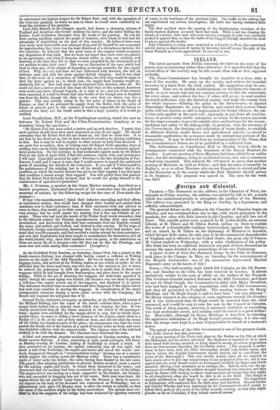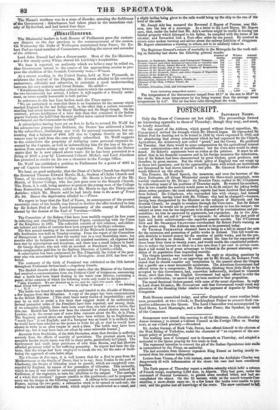§oreign ant( eolonittl.
Fitairca.—The discussion on the address, in the Chamber. of Peers, ter- minated on Friday evening: the address was carried by 120 to 23; a result which was understood greatly to strengthen the position of the Ministry. The address was presented to the King on Sunday, by a deputation, and suitably acknowledged.
The general debate on the address in the Chamber of Deputies began on. Monday, and was continued from day to day, with much animation in the speakers, but often with little interest in the Chamber, and still less out of doors. The notable points were, a speech by M. Ledru-Rollin, an extreme Liberal, at M. Thiers and M. Odilon Barrot, calling on them to explain the terms of a discreditable coalition between them against the Ministry; and an attack by M. Thiers on the diplomacy of Ministers in America, which favours little states, he said, sure to be the commercial dependencies of England, and is offensive to the United States, the great ally of France. M. Guizot replied on Wednesday, with a calm vindication of his policy But there has been no sufficient interest in any part of these discussions to occupy the space devoted to the proceedings of our own Parliament.
A grand review of forty-five thousand troops by the Duke de Nemours, took place in the Champs de Mars, on Saturday, for the entertainment of the Moorish Ambassador: one of the manceuvres represented Marshal Bugeaud's army at the battle of 'sly !
hrma.—The half-monthly mall, which left Calcutta on the 7th Decem- ber, and Bombay on the 15th, has been received in London. It almost exclusively relates to the state of affairs on the borders of the Punjaub. The Governor-General reached Kurnaul on the 26th November; and there he met Sir Hugh Gough, the Commander-in-chief, with Major Broadfoot, who had been engaged in some negotiations with the Sikh Government;
and they all proceeded to Umballah. The meeting between Sir ardinge and Sir Hugh Gough is said to have been " not very pleasant Henry'':
Sir Henry objected to the advance of some regiments towards the frontier; and it was understood that Sir Hugh would be removed from the chief command, and would be sent to take his seat in the Council at Calcutta. The truth of these reports, however, is extremely doubtful; as everything was kept profoundly secret, and nothing could be traced to a good author- ity. Meanwhile, although Sir Henry Hardinge is described as resenting the aggressive indications of Sir Hugh Gough's proceedings, it is also said that the troops were kept in a state of preparation to march at a moment's notice.
The actual position of the Sikh Government is one of the greatest doubt. The Delhi Gazette has this account-
" A great meeting of the Punts took place at the Durbar on the 22d, at which the Maharajah and his mother attended. His Highness is reported to us to have been taxed with having assented, or being about to assent, to certain pro.positions from our Government regarding. the Cis-Sutlej states. [The proposal is under- stood to have been, that the Sikh Government should cede certain tracts, and that in return the English Government should furnish aid to consolidate the power of the Maharajah.] This was stoutly denied, when all are reported to have sworn never to give any acquiescence to any proposition from us; and it was agreed that the army should march on Ferozepoor, to which the Ranee and Chiefs assented, offering every assistance as to carriage, &c. Indeed,. such was the ap- pearance of cordiality, that the soldiers thought treachery was intended, and then taxed the Ranee with wishing to throw them amongst our troops that they might be all slaughtered, when she would be able to do as she liked. This design 15 actually attributed to Lall Singh by our native correspondent. The impression at Ferozepoore still continued that the Sikh army had marched. General Littler and Colonel Wheeler had been instructed by the Commander-in-chief merely to defend their posts in the event of the Sikhs actually crossing„ so that they might plunder as far as Umballah, if they indeed ventured across."
The Islizam's territory was in a state of disorder, attesting the feebleness of the Government : disturbances had taken place in the immediate vici- nity of Hyderabad, and had lasted four days.



























 Previous page
Previous page